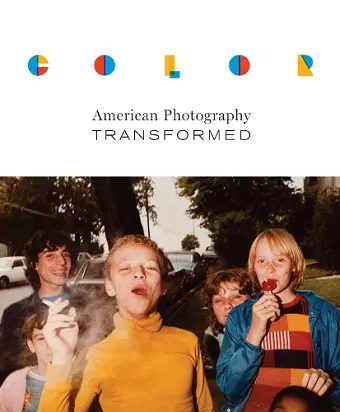Color
American Photography Transformed
Sylvie Pénichon author John Rohrbach author Amon Carter Museum of American Art author
Format:Hardback
Publisher:University of Texas Press
Published:15th Sep '13
Currently unavailable, and unfortunately no date known when it will be back

"This [book] makes an important contribution to the fields of photohistory and cultural history... You really get a sense of key players in the field: who had influence, how they exerted it, and what their agenda was (even if the agenda changed over time.) There is even a degree of suspense as the history unfolds." -- Britt Salvesen, Curator and Head of the Photography Department, Los Angeles County Museum of Art "Rohrbach has uncovered, through interviews and secondary sources, a great deal that has not been stated in print before ... a superior work." -- Arthur Ollman, San Diego State University, Founding Director of the Museum of Photographic Arts
The first book that addresses color in photography from the beginning of the medium to the present, this landmark copublication with the Amon Carter Museum of American Art explores how color transformed photography into today’s dominant artistic form.
Capturing the world in color was one of photography’s greatest aspirations from the very beginnings of the medium. When color photography became a reality with the introduction of the Autochrome in 1907, prominent photographers such as Alfred Stieglitz were overjoyed. But they quickly came to reject color photography as too aligned with human sight. It took decades for artists to come to understand the creative potential of color, and only in 1976, when John Szarkowski showed William Eggleston’s photographs at the Museum of Modern Art, did the art world embrace color. By accepting color’s flexibility and emotional transcendence, Szarkowski and Eggleston transformed photography, giving the medium equal artistic stature with painting, but also initiating its demise as an independent art.
The catalogue of a major exhibition at the Amon Carter Museum of American Art, which holds one of the premier collections of American photography, Color tells, for the first time, the fascinating story of color’s integration into American fine art photography and how its acceptance revolutionized the practice of art. Tracing the development of color photography from the first color photograph in 1851 to digital photography, John Rohrbach describes photographers’ initial rejection of color, their decades-long debates over what color brings to photography, and how their gradual acceptance of color released photography from its status as a second-tier art form. He shows how this absorption of color instigated wide acceptance of a fundamentally new definition of photography, one that blends photography’s documentary foundations with the creative flexibility of painting. Sylvie Pénichon offers a succinct survey of the technological advances that made color in photography a reality and have since marked its multifaceted development. These texts, illuminated by seventy-five full-page plates and more than eighty illustrations, make this book a groundbreaking contribution to photographic studies.
"The invention of the Autochrome in 1907 ushered color into photography and excited artists at the time. But then something strange happened: they recoiled from color, feeling it was too similar to the way we see the world. If the burgeoning medium of photography couldn't provide something different than what each of us could see using our own eyes, what was it good for? Color: American Photography Transformed tracks the curious history of color in American photography and is a sumptuous beauty to hold in the hand, with images from Walker Evans, Irving Penn and Ansel Adams, among many others." - Kirkus "This volume examines in detail what colour brings to photography and its connections to other arts, particularly painting. Expansive in focus and attractively presented 25-30 full-page reproductions illuminate each essay. An overview of technical advances and an impressive bibliography conclude the book. Entertaining, informative and vivid in its examples, this new scholarly interpretation is a valuable work... Summing Up: Highly recommended" - Choice "John Rohrbach's terrific book, copiously illustrated and footnoted, significantly enlarges the scope of this history and our understanding. The four chapters - "Inventing Color Photography"; "Defining Color, 1936-1970"; "Using Color, 1970-1990"; and "Interrogating Color, 1990-2010" - offer a sweeping view of multi-hued photography as a problem that bedeviled - and a mirage that beguiled - generations of inventors, artists, critics, and businesses." - Collector Daily
ISBN: 9780292753013
Dimensions: 305mm x 254mm x 33mm
Weight: 2381g
344 pages